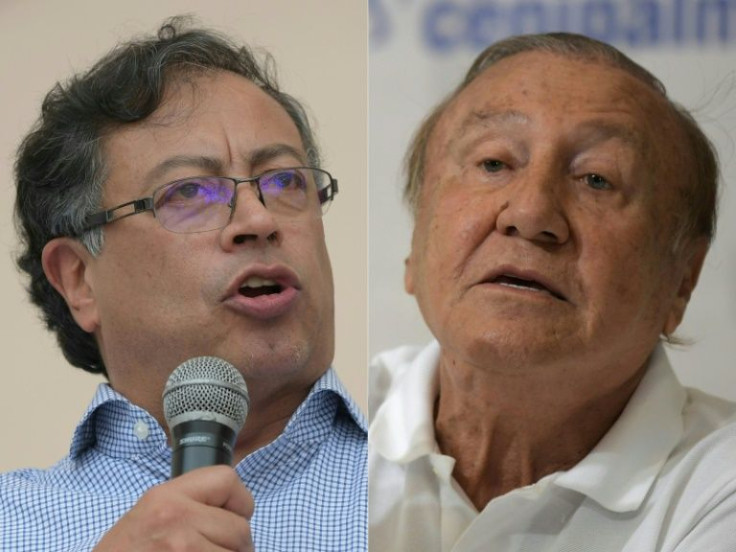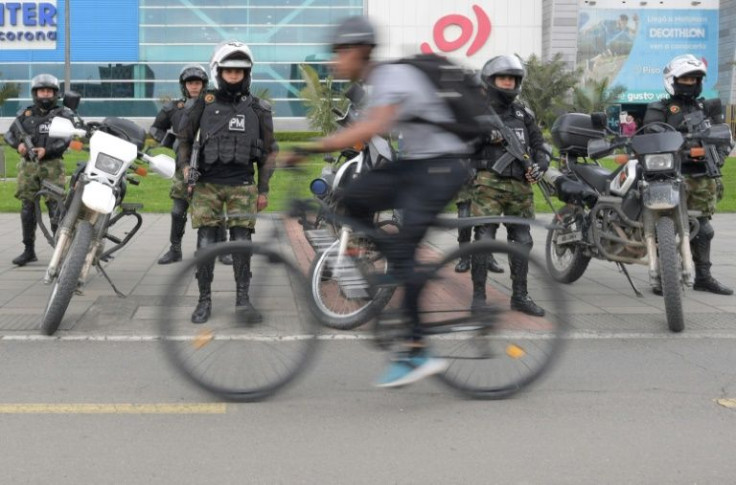From The Streets To The Polls, The Enigma Of Colombia's Abstaining Youth
A year ago, Colombia's streets were flooded with anti-government protesters angered by a proposed tax increase as citizens reeled from the economic impact of the pandemic.
At the helm were many young people.
But while they can "dynamize" election campaigns, young people here rarely vote on election day, political expert Danny Ramirez from the University of Rosario told AFP.
In Sunday's presidential runoff, attracting this demographic that is often apathetic could be the difference between winning and losing.
Colombians will vote for a successor to the hugely unpopular right-wing President Ivan Duque, who is barred from standing for reelection.
Leftist former guerrilla Gustavo Petro, 63, and millionnaire construction magnate Rodolfo Hernandez, 77, are neck-and-neck in opinion polls.
The polls suggest 45 percent of the population will abstain and between two and five percent are undecided.
Among these groups are many of Colombia's nine million registered voters aged between 18 and 28.
"People blame us for not voting, but many of us youths have waged a hard battle in this campaign, in the streets, so that this government will fall," said Stefanny Ramirez, 22, a volunteer for Petro's Historic Pact coalition.

Even though the two run-off candidates do not represent Colombia's traditional conservative and liberal parties, many young people remain disillusioned.
"I feel the same people as always are coming back to govern," complained cashier Sebastian Rodriguez, 22, who is planning on submitting a blank vote.
His skepticism is not uncommon among young people distrustful of state institutions in Colombia.
Of 2,200 people aged 18 to 32 surveyed in April by the polling firm Cifras y Conceptos, around four-fifths said they had no faith in the executive branch, congress or political parties. And more than half said none of the first round candidates represented them.
"We young people do not have many opportunities and the truth is that we need a good president to give us job opportunities," said Darian Zabaleta, 26, who said he will vote for Petro.
Many experts feel that the political classes are out of touch with the concerns of young people, one-fifth of whom are unemployed.
The new generations born in big cities far from the battlegrounds of Colombia's six-decade-long armed conflict mobilize for environmental, feminist or ethnic causes, said Ramirez of Rosario University.

In that respect, Petro has been more successful in attracting young people through his defense of human rights, the environment and support for free education.
He also supported the April 2021 anti-government protests and criticized the heavy-handed response from security forces.
"A lot of young people in Colombia are very attracted to him, like they were to (President Gabriel) Boric in Chile," analyst Michael Shifter of the Inter-American Dialogue think tank told AFP.
"The real question is whether Petro is able to get these people to show up to the polls," added Elizabeth Dickinson, senior Colombia analyst at the International Crisis Group in Bogota.
Petro's choice of running mate, the black environmentalist Francia Marquez, has proved a masterstroke as her feminist, pro-environment and anti-racist discourse has resonated with the young.
Psychologist Cristina Andrade, 25, said she will vote for Petro "basically due to his proposals but also because he is supported by Francia, who adds weight."
"We're used to a government that's only from one side," Andrade told AFP, meaning the right.
Petro, she added, "will have a different point of view. We need to try something different to change the country."
Hernandez, the self-styled "King of Tiktok", has run his campaign almost exclusively on social media.
His simple, colloquial language has struck a chord with many young people.
"He doesn't act like a traditional politician and this highly disruptive manner ... the jargon he uses, makes it easy for him to connect with the youth," said Fabian Mayorga, 22, Hernandez's youth co-ordinator.
But Ramirez is wary of the unpredictable maverick, who has already made 180-degree policy turns on the campaign trail without batting an eyelid, and how he would react to a street protests.
"The social outbreak has not been resolved ... it calmed down because we entered the hard part of the campaign and that's when democracies are supposed to resolve these fractures through electoral processes," said the political expert.
"We don't know exactly how he would treat a social uprising.
"What we do know is that he has a confrontational style ... that is a tendency very likely to be intolerant of discussion."
Hernandez insists he will listen to youth concerns if elected, and vowed not to use riot police "against people's right to demonstrate."
© Copyright AFP 2024. All rights reserved.





















